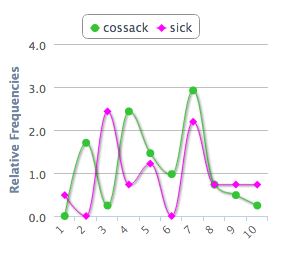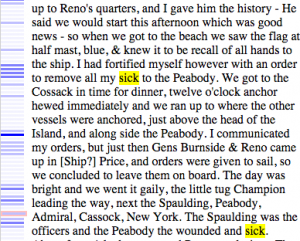I could not think of anything to support or contradict the hypothesis given. So instead I used Voyant tools to choose a word that would pose a question or two for me to think about. I started with “Cossack” because I thought it would be interesting to see which words linked to it, and then I though “sick” would work really well connecting to it.
So rather than finding data to support or contrast Professor Jakacki’s hypothesis, I made my own hypothesis by looking at the two words, “Cossack” and “sick”. My hypothesis is that I think that the words “Cossack” and “sick” will consistently appear together because James Merrill Linn wrote how people were always getting sick aboard the ship. This was either because they got seasick out on the rough ocean, or just since they were all stuck in a tight space together for long period of time, diseases spread faster.
First, I started by seeing how many times the different words appear in the text. “Cossack”, appears 46 times, while “sick” shows up only 38 times. Then I decided to look at the relative frequencies of the two words compared to on e another. The first thing I noticed was how extreme the frequencies were, they never really remained flat for a long period of time. The result of comparing them was also not what I expected. In segments 1, 2, 3, and 4 the two words did not have even slightly similar word trends, they were complete opposites. However, in segments 5, 7, 8 and 9 they had either identical word trends or very similar ones, as shown below. And although this somewhat supports my hypothesis, it does not completely.
e another. The first thing I noticed was how extreme the frequencies were, they never really remained flat for a long period of time. The result of comparing them was also not what I expected. In segments 1, 2, 3, and 4 the two words did not have even slightly similar word trends, they were complete opposites. However, in segments 5, 7, 8 and 9 they had either identical word trends or very similar ones, as shown below. And although this somewhat supports my hypothesis, it does not completely.
The most uses of the word “sick” were in the third segment of the text, where almost all of the men were getting sick from the rocking of the boat. In one  diary entry, “sick” was used 4 times, and in the one right after it was used 5 times. “Cossack” is used, as I expected, most often when they are aboard the ship, but also when they are about to go on it or right after they got off the boat. The word frequencies overlap especially in segments 5 and 8 because that is when the men in the army and their prisoners were getting very sick aboard the ship.
diary entry, “sick” was used 4 times, and in the one right after it was used 5 times. “Cossack” is used, as I expected, most often when they are aboard the ship, but also when they are about to go on it or right after they got off the boat. The word frequencies overlap especially in segments 5 and 8 because that is when the men in the army and their prisoners were getting very sick aboard the ship.
Distant reading was very helpful in this situation with looking up those two words. Although I did not get a clear answer to whether my hypothesis was accurate or not, I think it was in the broad sense, and distant reading definitely helped to prove that.